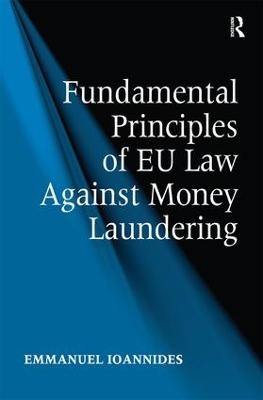
Fundamental Principles of EU Law Against Money Laundering
Seiten
2014
Routledge (Verlag)
978-1-4724-3188-2 (ISBN)
Routledge (Verlag)
978-1-4724-3188-2 (ISBN)
- Titel z.Zt. nicht lieferbar
- Versandkostenfrei
- Auch auf Rechnung
- Artikel merken
This book critically analyses fundamental principles of EU law for the control of international economic crime. Discussing how the reporting system and the exchange of information are at the heart of the global Anti Money Laundering regime.
This book critically analyses fundamental principles of EU law for the control of international economic crime. Discussing how the reporting system and the exchange of information are at the heart of the global anti-money laundering regime, the study also looks at the inferential force of financial intelligence in criminal proceedings and the responsibilities this places on prosecutors and criminals alike. The author closely examines the application of Article 8(2) of the European Court of Human Rights for the retention and movement of the fingerprints, cellular samples and DNA profiles of unconvicted persons, and argues the incompatibility with the ECHR, along with the effect of socially stigmatising unconvicted persons. The work concludes with exploring how financial regulation has, inter alia, shifted responsibility to businesses and financial institutions to become more transparent and accountable to financial regulators and tax authorities. This critical analysis is essential reading for law students and the Judicial Body, as well as financial crime investigators and regulators.
This book critically analyses fundamental principles of EU law for the control of international economic crime. Discussing how the reporting system and the exchange of information are at the heart of the global anti-money laundering regime, the study also looks at the inferential force of financial intelligence in criminal proceedings and the responsibilities this places on prosecutors and criminals alike. The author closely examines the application of Article 8(2) of the European Court of Human Rights for the retention and movement of the fingerprints, cellular samples and DNA profiles of unconvicted persons, and argues the incompatibility with the ECHR, along with the effect of socially stigmatising unconvicted persons. The work concludes with exploring how financial regulation has, inter alia, shifted responsibility to businesses and financial institutions to become more transparent and accountable to financial regulators and tax authorities. This critical analysis is essential reading for law students and the Judicial Body, as well as financial crime investigators and regulators.
Emmanuel Ioannides is an AML/Compliance expert. He is a qualified jurist and works as an independent advisor.
Introduction; Part I Basic Principles; Chapter 1 The Rationale of Money Laundering Controls; Chapter 2 How the Criminal Enterprise is Resisted and Disrupted; Chapter 3 Transnational Organised Crime and Corruption; Part II Advanced Principles; Chapter 4 Restructuring Unaccountable Wealth and the Tax Issue; Chapter 5 Disclosure of Offences, the Anatomy of the Conspiracy Charge and the Burden of Proof; Chapter 6 Financial Intelligence; Chapter 7 The Impact of the Retention of Personal Data on the Rights of Unconvicted Persons and the Effects of Financial Regulation on Businesses; Chapter 8 Conclusion;
| Erscheint lt. Verlag | 3.12.2014 |
|---|---|
| Verlagsort | London |
| Sprache | englisch |
| Maße | 156 x 234 mm |
| Gewicht | 530 g |
| Themenwelt | Recht / Steuern ► Allgemeines / Lexika |
| Recht / Steuern ► EU / Internationales Recht | |
| Recht / Steuern ► Strafrecht ► Kriminologie | |
| Sozialwissenschaften | |
| ISBN-10 | 1-4724-3188-X / 147243188X |
| ISBN-13 | 978-1-4724-3188-2 / 9781472431882 |
| Zustand | Neuware |
| Haben Sie eine Frage zum Produkt? |
Mehr entdecken
aus dem Bereich
aus dem Bereich
klare Antworten aus erster Hand
Buch | Softcover (2023)
UTB (Verlag)
CHF 27,85


